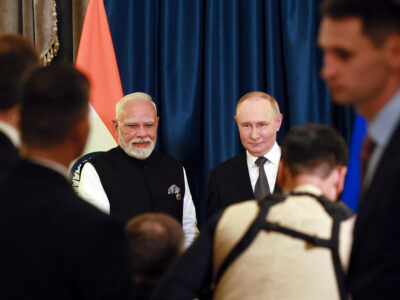A New Leader in Indonesia: What Are the Implications for the United States?
Prabowo Subianto will take the helm on October 20 as Indonesia’s president after his big election win earlier this year at a time of both national optimism and global crises. The previous president Joko Widodo delivered strong economic growth, and Indonesia is projected to overtake Germany and the U.K. to become the world’s seventh largest economy by 2030. However, the growing U.S.-China rivalry continues to roil the region including the South China Sea. Washington would like to enlist Jakarta in its self-proclaimed global battle against autocracies. The escalating crisis in the Middle East is another stressor – Indonesia, along with many Global South states, has taken a different approach from the United States toward the ongoing war.
How could U.S.-Indonesia relations shift with Prabowo as president? How will Jakarta and ASEAN respond to any further escalations in Taiwan or the South China Sea? What does Indonesia’s rise mean for the significance of the Global South in U.S. foreign policy?
To discuss these questions and more, the Quincy Institute held a discussion featuring Marc Mealy, senior vice president-policy at the U.S.-ASEAN Business Council, Dewi Fortuna Anwar, research professor at the Research Center for Politics-National Research and Innovation Agency (BRIN), and Ambassador Piper Campbell, professor of practice at American University’s School of International Service (SIS). Sarang Shidore, director of the Global South program at the Quincy Institute, moderated.
Program
Topics
Countries/Territories
Entities
Panelists

Marc Mealy
Marc Mealy is the senior vice president-policy at the U.S.-ASEAN Business Council. He manages the Council’s information products, coordinates advocacy efforts, and serves as the in-house lead on international trade policy. He joined the Council in 2003 as the senior director for Malaysia, Philippines and Brunei Affairs as well as coordinator of the Council's ASEAN Financial Services Working Group. He was named vice president in 2010 and promoted to senior vice president and of policy in 2017. Marc has over thirty years of experience in international trade and economics and has held positions in the U.S. government and NGO community.

Dewi Fortuna Anwar
Dewi Fortuna Anwar is a research professor at the Research Center for Politics-National Research and Innovation Agency (BRIN). Dewi is also the board of directors of the Institute for Democracy and Human Rights at the Habibie Center and an Academician for the Social Science Commission at the Indonesian Academy of Science. Between 2010 and 2015, Dewi served as Deputy Secretary for Political Affairs, and from 2015 to 2017 as Deputy for Government Policy Support to Indonesian Vice President Boediono and Vice President M. Jusuf Kalla. In 1998-99 Dewi served as Assistant Minister of State Secretariat for Foreign Affairs during the Habibie Presidency.

Piper Campbell
Ambassador Piper Campbell is a professor of practice at American University’s School of International Service (SIS). She chairs SIS’s Department of Foreign Policy and Global Security, as well as the ASEAN and Indo-Pacific Studies Initiative (AIPSI). She also regularly coordinates classes for the State Department’s Foreign Service Institute. She previously led the U.S. Mission to ASEAN in 2018. Prior to that, she served as Chief of Mission, U.S. Embassy Ulaanbaatar (2012-2015); taught at the National Defense University (2015-2017); served as Consul General in Basrah, Iraq; and led the State Department’s office responsible for the recruitment of foreign service officers.

Sarang Shidore
Sarang Shidore is director of the Global South Program at the Quincy Institute, and a senior non-resident fellow at the Council on Strategic Risks. He is also a member of the adjunct faculty at George Washington University, where he teaches a class on the geopolitics of climate change. He researches and writes on the geopolitics of the Global South, Asia, and climate change. Sarang has more than 125 publications to his credit in journals, edited volumes, and media outlets in his areas of expertise, including in Foreign Affairs, Foreign Policy, The New York Times, The Nation, South China Morning Post, Council on Foreign Relations, Energy Policy, Energy Research & Social Science and others. Prior to his current role, Sarang was director of studies at the Quincy Institute, senior research scholar at the University of Texas at Austin, and senior global analyst at the geopolitical risk firm Stratfor Inc. and previously also spent more than a decade in engineering and product management in the technology industry.




